 Women after 40 years old feel changes in the body. A period of premenopause begins. The premenopause period is characterized by a weakening of the ovaries. Most often, a woman can feel that you already have such a period finding the following symptoms such as:
Women after 40 years old feel changes in the body. A period of premenopause begins. The premenopause period is characterized by a weakening of the ovaries. Most often, a woman can feel that you already have such a period finding the following symptoms such as:
- the menstrual cycle violation;
- change in the secretions’ amount;
- dryness during intimacy;
- depression;
- frequent urination;
- fatigue.
These changes are caused by the hormonal level because the amount of estrogen and progesterone falls. That is why doctors recommend hormonal contraceptives that normalize hormonal levels and relieve premenopausal symptoms.
These birth control options are included in the list of products at favorable prices. Many women aged 40-49 can afford to buy these birth control options.
Hormonal birth control pills
Only a specialist should prescribe birth control pills. It is better not to buy ше without a doctor’s prescription since there is a risk not only of disrupting the hormonal background, but also getting a lot of side effects and diseases. For example, it is contraindicated to take such drugs for women who have:
- varicose veins;
- hypertension of the second degree;
- a predisposition to blood clots;
- oncology diagnosis.
All birth control pills can be divided into several groups. The first group includes combined oral contraceptives (COCs). They inhibit ovulation and thereby prevent pregnancy. Among the most popular drugs in this group, there are Yaz, Alesse, Yasmin, etc. COCs should be taken from the first days of menstruation for 21 days, followed by a break or for 28 days without it.
The second group is gestagenic hormonal drugs. They provide a softer effect in comparison with the first group. The most popular are the so-called mini-pills. A woman should take mini-pills at regular intervals. Efficiency compared to combined oral birth control is less, but they have fewer contraindications.
In general, birth control will need to be taken at least 6 months after the last period. It is explained by the fact that after 40, there are long interruptions in the menstrual cycle. Menstruation may not come for months, but this does not mean that you can no longer get pregnant.
Contraceptive suppositories
Suppositories have many advantages over other birth control options. Such protection is more suitable for women who keep an inactive sex life. Contraceptive suppositories have additional functions, including the lubrication effect. If, during sexual intercourse, the woman does not have enough mucous secretion, then this birth control means will help increase it, avoid the feeling of discomfort.
Moreover, suppositories partly protect against STDs. At the same time, suppositories are not able to have a systemic effect. They work exclusively at the local level, do not penetrate the blood, and do not affect the menstrual cycle.
Indications for use
- The use of contraceptive suppositories is indicated for patients in such cases:
- postpartum contraception or during the hepatitis B period, when hormonal agents are prohibited;
- to prevent unwanted conception in patients who are contraindicated in COCs or barrier contraceptives;
- to prevent unplanned conception if you accidentally miss taking COCs.
- vaginal contraceptive suppositories are indispensable if you need one-time contraception, as well as for women in premenopausal age.
How do birth control suppositories work?
This type of contraceptive has a spermicidal effect. They contain a substance (nonoxynol, benzalkonium chloride, etc.) that almost instantly kills spermatozoa, thus preventing conception. Besides, some funds of this type are capable of causing copious secretion of vaginal mucus, which prevents the penetration of the sperm into the uterine cavity. It is a double effect. Suppositories guarantee 80% safety.
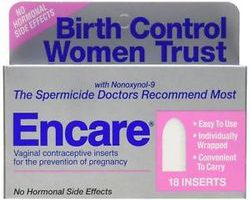
Encare Review
- Active Ingredient: Nonoxynol-9
- Release Form: Vaginal Suppository
- Age: 18 - 55 years
- Average Price: $200 - $220
Vaginal ring and transdermal patch
The vaginal ring and transdermal patch are recommended for those who are not able to take pills regularly every day or suffer from diseases of the gastrointestinal tract. These are also referred to combined contraceptives that have a systemic effect – the estrogen and progesterone. They penetrate the vaginal walls (ring) or through the skin (patch) enter the blood flow, bypassing the gastrointestinal tract.
The vaginal ring is a device that is placed in the vagina. Like pills, it suppresses ovulation and also creates a barrier for sperm, due to which pregnancy does not occur. The ring is very convenient to use. It is put in the first days of menstruation (a visit to the doctor is necessary only for its appointment). It persists for 21 days. It does not cause any inconvenience either during physical exertion or during sexual intercourse.
The transdermal patch is also used for three weeks. There are three of them in the package, each designed for a week. The first one is stuck to the skin on the first day of menstruation. After a week, a woman should change it. Three weeks after, there is a 7-day break. A woman can safely visit the bathhouse, the pool. The transdermal patch size is only 2×2 cm, flesh-colored. A woman can stick it on the shoulders, under the shoulder blade, on the thigh, on the lower abdomen, on the buttocks. It is important to alternate places.
The effectiveness of these birth control options does not depend on the state of the gastrointestinal tract. The ability to have a baby is just as easily reversible as with oral contraceptives. Contraindications are the same as for oral birth control.
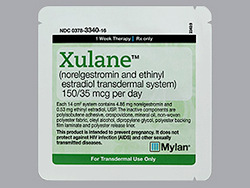
Xulane Review
- Active Ingredient: Ethinyl Estradiol / Norelgestromin
- Release Form: Transdermal Patch
- Age: 18 - 45 years
- Average Price: $120
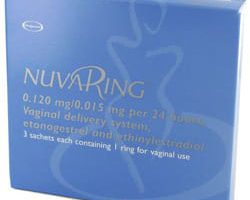
NuvaRing Review
- Active Ingredient: Ethinylestradiol / Etonogestrel
- Release Form: Vaginal Ring
- Age: 18 - 40 years
- Average Price: $165
Injections for birth control
The injections are considered 99% effective. The effect duration varies from 8 to 13 weeks, depending on the drug used. The injections do not interfere with other medications but can cause menstrual violations or even arrest menstruation altogether. After discontinuing injections, it may take up to a year for fertility to restore.
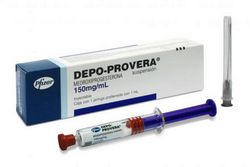
Depo-Provera Review
- Active Ingredient: Medroxyprogesterone Acetate
- Release Form: Suspension for Injection
- Age: 18 - 45 years
- Average Price: $110
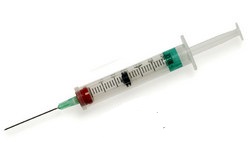
Depo-Subq Provera 104 Review
- Active Ingredient: Medroxyprogesterone Acetate
- Release Form: Suspension for Injection
- Age: 18 - 45 years
- Average Price: $250
Layolis Fe Review
Jolessa Review
Introvale Review
Drospirenone / Ethinyl Estradiol / Levomefolate Calcium Review
Rajani Review
Ocella Review
Seasonale Review
Tydemy Review
Safyral Review
Natazia Review
Balcoltra Review
Ashlyna Review
Dienogest / Estradiol Review
Slynd Review
Drospirenone Review
LoSeasonique Review
Daysee Review
Amethia Review
Seasonique Review
Camrese Review
Fayosim Review
Quartette Review